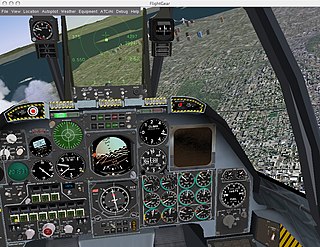Related Research Articles

id Software LLC is an American video game developer based in Richardson, Texas. The company was founded on February 1, 1991, by four members of the computer company Softdisk, programmers John Carmack and John Romero, game designer Tom Hall, and artist Adrian Carmack. Business manager Jay Wilbur was also involved. id Software made important technological developments in video game technologies for the PC, including work done for the Wolfenstein, Doom, and Quake franchises. id's work was particularly important in 3D computer graphics technology and in game engines that are used throughout the video game industry. The company was involved in the creation of the first-person shooter (FPS) genre. Wolfenstein 3D is often considered to be the first true FPS, Doom is a game that popularized the genre and PC gaming in general, and Quake was id's first true 3D FPS.

Tux Racer is a 2000 open-source winter sports racing video game starring the Linux mascot, Tux the penguin. It was originally developed by Jasmin Patry as a computer graphics project in a Canadian university. Patry and later the newly founded Sunspire Studios, composed of several former students of the university, would soon expand it. In the game, the player controls Tux as he slides down a course of snow and ice collecting herring.

Loki Entertainment Software, Inc. was a video game developer based in Tustin, California, United States, that ported several video games from Microsoft Windows to Linux. It took its name from the Norse deity Loki.

Hyperion Entertainment CVBA is a Belgian software company which in its early years focused in porting Windows games to Amiga OS, Linux and Mac OS. In 2001, they accepted a contract by Amiga Incorporated to develop AmigaOS 4 and mainly discontinued their porting business to pursue this development. AmigaOS 4 runs on the AmigaOne systems, Commodore Amiga systems with a Phase5 PowerUP accelerator board, Pegasos II systems and Sam440/Sam460 systems.
2001 saw many sequels and prequels in video games. New intellectual properties include Animal Crossing, Burnout, Gothic, Black & White, Devil May Cry, Oni, Halo: Combat Evolved, Jak and Daxter: The Precursor Legacy, Max Payne, Operation Flashpoint: Cold War Crisis, Pikmin, Red Faction, Serious Sam, Tom Clancy's Ghost Recon and Tropico.
Sam Oscar Lantinga is a computer programmer. He used to be the lead software engineer at Blizzard Entertainment, where he was known to the community as Slouken. He is best known as the creator of the Simple DirectMedia Layer, a very popular open source multimedia programming library, and also developed the compatibility database for Executor, a proprietary Mac OS emulator.
Linux Game Publishing is a software company based in Nottingham in England. It ports, publishes and sells video games running on Linux operating systems. As well as porting games, LGP also sponsors the development of Grapple, a free software network library for games. As well as acting as a Linux game porter in of themselves, they also function as a publisher for other Linux game developers and porters.
Mac gaming refers to the use of video games on Macintosh personal computers. In the 1990s, Apple computers did not attract the same level of video game development as Microsoft Windows computers due to the high popularity of Microsoft Windows and, for 3D gaming, Microsoft's DirectX technology. In recent years, the introduction of Mac OS X and support for Intel processors has eased porting of many games, including 3D games through use of OpenGL and more recently Apple's own Metal API. Virtualization technology and Boot Camp also permit the use of Windows and its games on Macintosh computers. Today, a growing number of popular games run natively on macOS, though as of early 2019, a majority still require the use of Microsoft Windows.
EVO Smart Console is a media PC and video game console marketed in the seventh generation era, and produced by Envizions. The beta, called EVO: Phase One, was released on October 20, 2006, and the final product was released on November 20, 2008.

An open-source video game, or simply an open-source game, is a video game whose source code is open-source. They are often freely distributable and sometimes cross-platform compatible.
Linux gaming refers to playing video games on the Linux operating system.

Ryan C. Gordon is a computer programmer and former Loki Software employee who is now responsible for icculus.org, which hosts many Loki Software projects as well as several new projects created by himself and others. Gordon's site hosts projects with the code from such commercial games as Duke Nukem 3D, Shadow Warrior, Quake III Arena and many other free and open source projects for multiple platforms.

SuperTuxKart (STK) is a free and open-source kart racing game, distributed under the terms of the GNU General Public License, version 3. It features mascots of various open-source projects. SuperTuxKart is cross-platform, running on Linux, macOS, Windows, and Android systems. Version 1.0 was officially released on April 20, 2019.

Tux, of Math Command is an open source arcade-style video game for learning arithmetic, initially created for Linux.

Tux is a penguin character and the official brand character of the Linux kernel. Originally created as an entry to a Linux logo competition, Tux is the most commonly used icon for Linux, although different Linux distributions depict Tux in various styles. The character is used in many other Linux programs and as a general symbol of Linux.

Timothée Besset is a French software programmer,, best known for supporting Linux, as well as some Macintosh, ports of id Software's products. He has been involved with the game ports of various id properties over the past ten years, starting with Quake III Arena. Since the development of Doom 3 he was also in charge of the multiplayer network code and various aspects of game coding for id, a role which had him heavily involved in the development of their online game QuakeLive.
Tux Games was one of the first still active online Linux game retailers, founded on 1 January 2000 by Michael Simms, who would later also found Linux Game Publishing. It was originally created in response to Simms being unable to order a version of Loki Software's port of Civilization: Call to Power from any British reseller.

Desura was a digital distribution platform for the Microsoft Windows, Linux and OS X platforms. The service distributed games and related media online, with a primary focus on small independent game developers rather than larger companies. Desura contained automated game updates, community features, and developer resources. The client allowed users to create and distribute game mods as well.

elementary OS is a Linux distribution based on Ubuntu LTS. It promotes itself as a “fast, open, and privacy-respecting” replacement to macOS and Windows and has a pay-what-you-want model. The operating system, the desktop environment, and accompanying applications are developed and maintained by Elementary, Inc.
References
- ↑ A closed source company’s CEO’s view on open source Archived 2012-04-22 at the Wayback Machine Linux Game Publishing Blog, June 29, 2009 (Article by Michael Simms)
- ↑ Michael Simms’s Experience Archived 2012-07-15 at Archive.today LinkedIn
- ↑ MobyGames, Descent 3 - Linux beta testers
- 1 2 Bringing Windows games to Linux TechRadar, 10 August 2009 (Interview by Graham Morrison)
- ↑ LGP History pt 2: The Early Days Archived 2011-08-12 at the Wayback Machine Linux Game Publishing Blog, June 23, 2009 (Article by Michael Simms)
- ↑ Linux Game Publishing: Interview with Michael Simms Linux Gazette, March 6, 2005
- ↑ Linux Game Publishing...the return? [ permanent dead link ] GamingOnLinux, January 31, 2012 (Article by Liam Dawe)